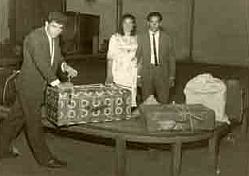 In the Bekaa Valley region, there are cities where Brazilian culture is present in most houses. This happens because of the return of immigrants that married and had children in Brazil. ‘When I arrived in Lebanon I had to take private classes to learn Arabic,’ said Mohamed Abdul Fattah, who was born in S
In the Bekaa Valley region, there are cities where Brazilian culture is present in most houses. This happens because of the return of immigrants that married and had children in Brazil. ‘When I arrived in Lebanon I had to take private classes to learn Arabic,’ said Mohamed Abdul Fattah, who was born in S
And in the same way that in Brazil there are Lebanese descendants, in the Lebanon there are Brazilian descendants. "Here (in Sultan Yacub) there are people who have never been to Brazil and speak Portuguese," stated Telma, who was born in the coastal city of Santos, in the southeastern state of São Paulo, and has been living in Lebanon for nearly fifteen years. "When I came over I didn’t speak any Arabic, but here 99% of the people speak Portuguese," she said.
Khatlab, who is going to publish in 2006 a research on Lebanese that emigrated to Brazil and returned to the Arab country, stated that many Lebanese married and had children in Brazil, and for this reason there is a strong influence of Brazilian culture in Lebanon. An example of this is Mohamed Abdul Fattah, who was born in São Paulo and, at the age of eight, moved with his parents to the city of Ghazzé. "When I arrived in Lebanon I had to take private classes to learn Arabic," said Fattah, who only spoke Portuguese.
Fattah’s father, Ahmad Abdul Fattah, came to Brazil when he was 14 years old, in 1967, and like many Arab immigrants started working as a peddler, until he managed to make some money and open and bed and bath linen store. "Then his brothers and my mother also moved to São Paulo," said Fattah, who was born in 1976 in the city of São Paulo.
"My uncles speak Portuguese because of me and my brothers," stated Fattah, referring to the uncles who learned to speak Portuguese to be able to communicate with the recently arrived relatives. "In Ghazzé the majority of the families have people who went to Brazil to work and came back after some time speaking Portuguese," he added.
According to him, Brazilian culture is also very present in the city. "During the World Cup season we support Brazil and make great parties," he said. In relation to food, Fattah’s family, like Orra’s, also eats rice and beans every day. "Here in Ghazzé everybody eats feijoada, coxinha, pastel (typical Brazilian dishes) together with kibbeh and sfihas," he remarked.
According to Khatlab, it was the Lebanese immigrants in Brazil themselves who took black beans to the Bekaa Valley. "It is not common to eat rice and beans in Lebanon, in the Bekaa Valley it is normal," he stated.
Mustafa El Orra, Telma’s husband, arrived in the coastal Brazilian city of Santos at the age of 17. He also worked as a peddler before he opened his first furniture shop in the city. "I married him and we had three children, it was after that that we came to Sultan Yacub," tells Telma, who has in her backyard a vegetable garden with kale, chayote and other vegetables, characteristic of Brazilian cuisine. "Here we find lots of Brazilian products, clothes, food. We have of everything," stated she, who frequently flies to Brazil to visit her daughter.
Brazil Avenue in Lebanon
According to Khatlab, the main street in Zahle, capital of the Bekaa Valley, is called Brazil Avenue, which received its name at about 1920, period in which many Lebanese families came back from Brazil.
Another curious fact Khatlab tells is that in 1961, after the end of his term, former Brazilian president Juscelino Kubitschek visited Zahle and was worried about his speech, as he didn’t speak Arabic. However, when he arrived at the city he was surprised at how many people spoke Portuguese.
History repeats itself
According to the Brazilian Telma, many Lebanese who have already lived in Brazil or Brazilians sons of immigrants are coming back to Brazil. "Everybody is leaving Sultan Yacub, because there is no work here. We have gone back to the old times," she stated. "My son is going to Brazil to make his life," she added.



